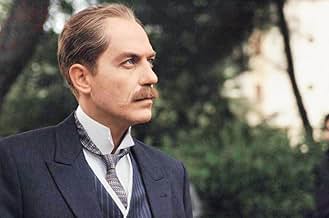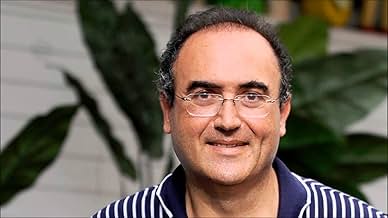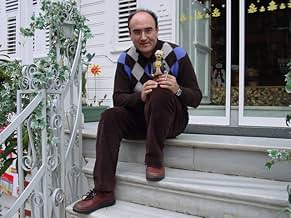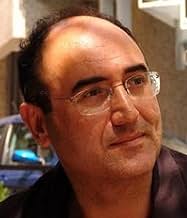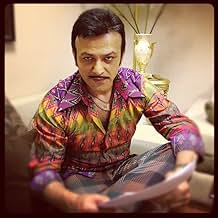IMDb RATING
7.2/10
7.7K
YOUR RATING
Story based on the memoirs of Salih Bozok, which traces the life of Mustafa Kemal Atatürk.Story based on the memoirs of Salih Bozok, which traces the life of Mustafa Kemal Atatürk.Story based on the memoirs of Salih Bozok, which traces the life of Mustafa Kemal Atatürk.
- Awards
- 1 win & 4 nominations total
Özge Özpirinçci
- Fikriye Hanim
- (as Özge Özpirinççi)
- Director
- Writer
- All cast & crew
- Production, box office & more at IMDbPro
Storyline
Did you know
Featured review
Mustafa Kemal Ataturk might be the only great man whose life has not been cinematized properly enough. Along with Ziya Öztan's Cumhuriyet (which is more like a Turkish independence movie than a Ataturk biograph)and Can Dundar's widely criticized Mustafa this is actually the first feature length movie on Ataturk. While Can Dundar's Mustafa was a botched up effort to knock Mustafa Kemal off his pedestal and humanize him, Livaneli's movie re-puts him on his perch. Livaneli's Veda starts when Ataurk is on his deathbed. Salih Bozok, who has been a friend to him since he was six is beside him. He calls for his son and tells him that if Ataturk passes away he will end his own life too.Then he starts to write what he recollects about the great leader. So the whole movie,at first glance,seems to be only from Salih Bozok's point of view. When it comes to history one man's point of view should be able to change the whole history you know about, shouldn't it?
Ataturk was one of the greatest men of the century he lived in and we are aware of the fact that his life could not be grasped in a 120 minute movie so it should be understandable that a movie may focus on one part of his life but exactly on what side of his life Livaneli focuses? From Bozok's eyes, Livaneli offers pieces of vignettes or short, impressionistic scenes that do not sound like an eye opener. For instance, the only tangible scene about his childhood is what young Kemal thinks about a children's game like leapfrog. Apparently, the writer and the director want us to think that Ataturk was too great to bend but not modest enough not to vault over other's stooped backs. If you would like to show someone as a child prodigy there are way better means to do that. Other than that the movie does not tell you anything new about Ataturk's childhood or teenage years let alone the fact that the teenage actor,Bartunç Akbaba,playing Musta Kemal offers a pretty wooden performance. Ataturk was an "homme de guerre" and wars are an inevitable part of "gens de guerre". The only scene you see Mustafa Kemal on the war field is the Gallipoli campaign. Let alone the fact that this amazing and unbelievable victory in Turkish history looks more like a poor reconstruction scene from a documentary, most of the little scene focuses on just a ditch.
When you are making a biopic your forte is supposed to be "character development." In Veda, it looks like that there are not many dynamic characters that level up over the course of the narrative.Other than the two major women who walk into Ataturk's life, no character changes a bit. At some point you think you are watching a movie about Fikriye Hanım vs. Latife Hanım. What about Ataturk's feelings on that struggle between Fikriye,who was representing the Orient and Latife who was the Occident?
While Veda duly notes that Ataturk resisted the pressures of historic enmities or "atrocity-mongering between the societies" it never mentions the resistance he met while realizing his reforms.To a foreign layman, the reforms may seem quite ordinary.Those reforms were historically unprecedented and it caused a major resistance from anti-secular circles in Anatolia which still goes on as a sort of Kulturkampf today.
I might prolong this comment but I guess I made myself clear.As a nation we tend to exalt our movies for no reason (like we have done for "Breath") but movies are not made for just one nation.They are made for the whole world to see. Livaneli's effort may be a worthy one(soundtracks,cinematography,costumes and some visual effects were upsides of the movie)but it's not enough to make the whole world see the great leader on the silver screen. I believe, the more movies are made on Ataturk, the better we will understand his legacy.
Ataturk was one of the greatest men of the century he lived in and we are aware of the fact that his life could not be grasped in a 120 minute movie so it should be understandable that a movie may focus on one part of his life but exactly on what side of his life Livaneli focuses? From Bozok's eyes, Livaneli offers pieces of vignettes or short, impressionistic scenes that do not sound like an eye opener. For instance, the only tangible scene about his childhood is what young Kemal thinks about a children's game like leapfrog. Apparently, the writer and the director want us to think that Ataturk was too great to bend but not modest enough not to vault over other's stooped backs. If you would like to show someone as a child prodigy there are way better means to do that. Other than that the movie does not tell you anything new about Ataturk's childhood or teenage years let alone the fact that the teenage actor,Bartunç Akbaba,playing Musta Kemal offers a pretty wooden performance. Ataturk was an "homme de guerre" and wars are an inevitable part of "gens de guerre". The only scene you see Mustafa Kemal on the war field is the Gallipoli campaign. Let alone the fact that this amazing and unbelievable victory in Turkish history looks more like a poor reconstruction scene from a documentary, most of the little scene focuses on just a ditch.
When you are making a biopic your forte is supposed to be "character development." In Veda, it looks like that there are not many dynamic characters that level up over the course of the narrative.Other than the two major women who walk into Ataturk's life, no character changes a bit. At some point you think you are watching a movie about Fikriye Hanım vs. Latife Hanım. What about Ataturk's feelings on that struggle between Fikriye,who was representing the Orient and Latife who was the Occident?
While Veda duly notes that Ataturk resisted the pressures of historic enmities or "atrocity-mongering between the societies" it never mentions the resistance he met while realizing his reforms.To a foreign layman, the reforms may seem quite ordinary.Those reforms were historically unprecedented and it caused a major resistance from anti-secular circles in Anatolia which still goes on as a sort of Kulturkampf today.
I might prolong this comment but I guess I made myself clear.As a nation we tend to exalt our movies for no reason (like we have done for "Breath") but movies are not made for just one nation.They are made for the whole world to see. Livaneli's effort may be a worthy one(soundtracks,cinematography,costumes and some visual effects were upsides of the movie)but it's not enough to make the whole world see the great leader on the silver screen. I believe, the more movies are made on Ataturk, the better we will understand his legacy.
- elsinefilo
- May 14, 2010
- Permalink
- How long is Veda - Atatürk?Powered by Alexa
Details
- Release date
- Country of origin
- Official sites
- Language
- Also known as
- Прощание
- Filming locations
- Thessaloniki, Greece(location)
- Production company
- See more company credits at IMDbPro
Box office
- Budget
- $6,000,000 (estimated)
- Gross worldwide
- $55,024,621
- Runtime1 hour 54 minutes
- Color
- Aspect ratio
- 2.35 : 1
Contribute to this page
Suggest an edit or add missing content


